英语中常见词根
英语中常见的词根词缀
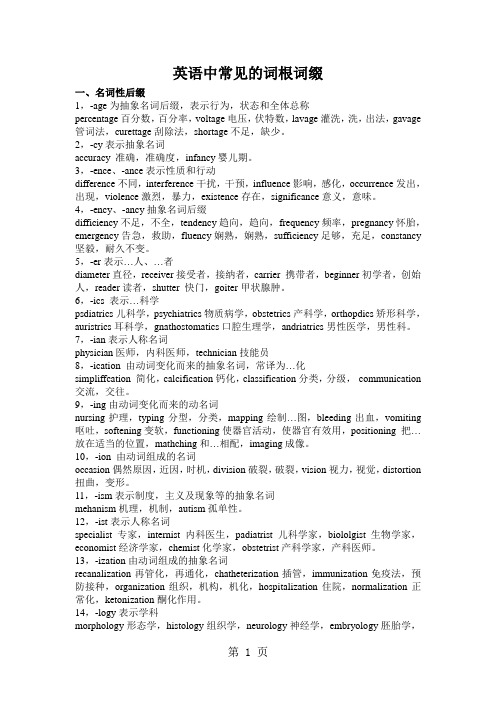
英语中常见的词根词缀一、名词性后缀1,-age为抽象名词后缀,表示行为,状态和全体总称percentage百分数,百分率,voltage电压,伏特数,lavage灌洗,洗,出法,gavage 管词法,curettage刮除法,shortage不足,缺少。
2,-cy表示抽象名词accuracy 准确,准确度,infancy婴儿期。
3,-ence、-ance表示性质和行动difference不同,interference干扰,干预,influence影响,感化,occurrence发出,出现,violence激烈,暴力,existence存在,significance意义,意味。
4,-ency、-ancy抽象名词后缀difficiency不足,不全,tendency趋向,趋向,frequency频率,pregnancy怀胎,emergency告急,救助,fluency娴熟,娴熟,sufficiency足够,充足,constancy 坚毅,耐久不变。
5,-er表示…人、…者diameter直径,receiver接受者,接纳者,carrier 携带者,beginner初学者,创始人,reader读者,shutter 快门,goiter甲状腺肿。
6,-ics 表示…科学psdiatrics儿科学,psychiatrics物质病学,obstetrics产科学,orthopdics矫形科学,auristrics耳科学,gnathostomatics口腔生理学,andriatrics男性医学,男性科。
7,-ian表示人称名词physician医师,内科医师,technician技能员8,-ication 由动词变化而来的抽象名词,常译为…化simpliffcation 简化,calcification钙化,classification分类,分级,communication 交流,交往。
9,-ing由动词变化而来的动名词nursing护理,typing分型,分类,mapping绘制…图,bleeding出血,vomiting 呕吐,softening变软,functioning使器官活动,使器官有效用,positioning 把…放在适当的位置,mathching和…相配,imaging成像。
英语常见词根词缀大全
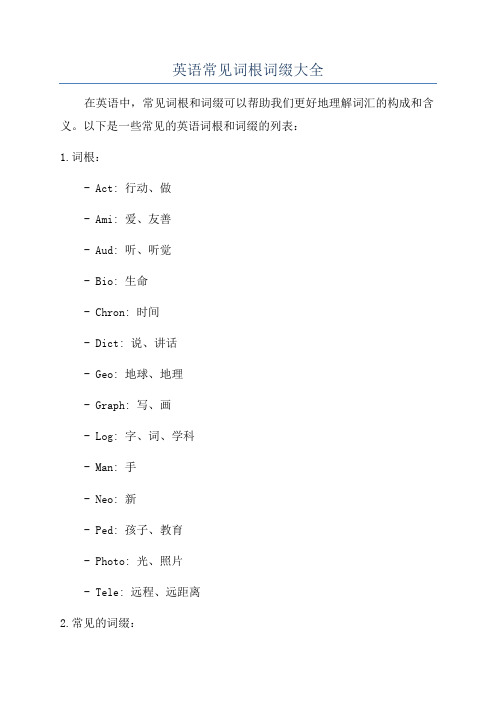
英语常见词根词缀大全
在英语中,常见词根和词缀可以帮助我们更好地理解词汇的构成和含义。
以下是一些常见的英语词根和词缀的列表:
1.词根:
- Act: 行动、做
- Ami: 爱、友善
- Aud: 听、听觉
- Bio: 生命
- Chron: 时间
- Dict: 说、讲话
- Geo: 地球、地理
- Graph: 写、画
- Log: 字、词、学科
- Man: 手
- Neo: 新
- Ped: 孩子、教育
- Photo: 光、照片
- Tele: 远程、远距离
2.常见的词缀:
- -able/-ible: 能够被……的
- -ic/-ical: ……的、与……相关的
- -logy: 学科、科学
- -ment: 结果、行为
- -ness: 状态、性质
- -ful: 充满……的、有……的
- -less: 没有……的
- -er/-or: ……的人、从业者
- -ism: 主义、信仰
- -ist: ……的人、从业者
- un-: 不
- re-: 再次、重新
- pre-: 在前、先
- super-: 超、在上面
- mis-: 错误、不正确
- non-: 非、不
这只是其中一部分常见的英语词根和词缀,还有很多其他的词根和词缀可以帮助我们理解词汇,扩大词汇量。
通过学习这些词根和词缀,我们可以更好地分析和理解英语单词的意义。
英语常用词根252个

英语常用词根252个
英语中常用的词根有很多,这些词根可以帮助我们理解和记忆单词的含义。
以下列举了一些常见的英语词根:
1. act 行动。
2. aud 听。
3. bio 生命。
4. chron 时间。
5. dict 说。
6. equ 相等。
7. fin 结束。
8. graph 写。
9. hydro 水。
10. jur 法律。
11. log 记录。
12. meter 测量。
13. narr 讲述。
14. path 感情。
15. rupt 突破。
16. the 放置。
17. vis 看。
这些词根可以通过前缀和后缀的组合形成各种单词,帮助我们
理解和记忆这些单词的含义。
例如,通过将词根"bio"和后缀"-logy"组合,可以形成"biology",表示生物学。
另外,通过将词根"graph"和前缀"auto-"组合,可以形成"autograph",表示亲笔签名。
除了上述列举的词根外,还有许多其他常见的词根,比如"tele-"(远程)、"struct-"(建造)、"port-"(携带)等等。
这些词根都是构成英语单词的重要组成部分,对于理解和记忆单词的含义都有很大帮助。
希望这些信息能够对你有所帮助。
英语中的词根

英语中的词根
英语单词的词根是指单词中具有基本意义且不能再拆分的部分。
词根可以是一个字母,也可以是由多个字母组成的词组。
以下是一些常见的英语单词词根及其意义:
1. Chrono-:表示时间(例如:chronograph - 计时器)
2. Bio-:表示生命(例如:biology - 生物学)
3. Geo-:表示地球(例如:geography - 地理学)
4. Tele-:表示远程(例如:telephone - 电话)
5. Auto-:表示自动(例如:automobile - 汽车)
6. Photo-:表示光线或照片(例如:photograph - 照片)
7. Micro-:表示微小(例如:microbiology - 微生物学)
8. Multi-:表示多个(例如:multimedia - 多媒体)
9. Uni-:表示一、单一(例如:unicorn - 独角兽)
10. Ex-:表示出、外(例如:export - 出口)
这些词根可以在不同的单词中重复出现,帮助我们理解和记忆单词的意义。
英语常用252个词根
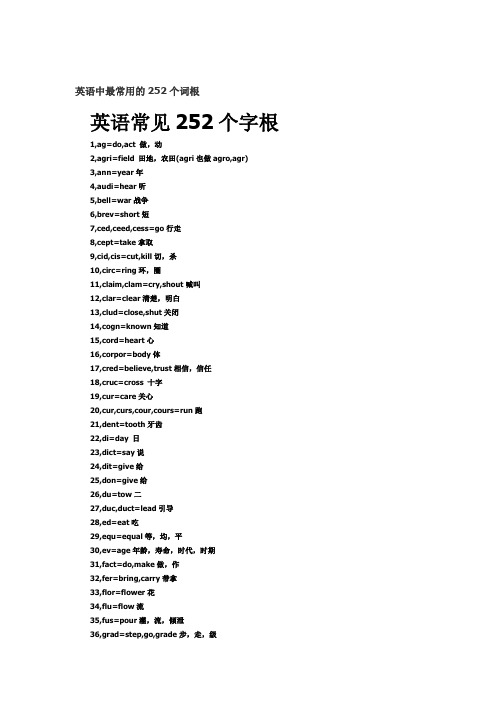
英语中最常用的252个词根英语常见252个字根1,ag=do,act 做,动2,agri=field 田地,农田(agri也做agro,agr)3,ann=year年4,audi=hear听5,bell=war战争6,brev=short短7,ced,ceed,cess=go行走8,cept=take拿取9,cid,cis=cut,kill切,杀10,circ=ring环,圈11,claim,clam=cry,shout喊叫12,clar=clear清楚,明白13,clud=close,shut关闭14,cogn=known知道15,cord=heart心16,corpor=body体17,cred=believe,trust相信,信任18,cruc=cross 十字19,cur=care关心20,cur,curs,cour,cours=run跑21,dent=tooth牙齿22,di=day 日23,dict=say说24,dit=give给25,don=give给26,du=tow二27,duc,duct=lead引导28,ed=eat吃29,equ=equal等,均,平30,ev=age年龄,寿命,时代,时期31,fact=do,make做,作32,fer=bring,carry带拿33,flor=flower花34,flu=flow流35,fus=pour灌,流,倾泄36,grad=step,go,grade步,走,级37,gram=write,draw写,画,文字,图形38,graph=write,records写,画,记录器,图形39,gress=go,walk 行走40,habit=dwell居住41,hibit=hold拿,持42,hospit=guest客人43,idio=peculiar,own,private,proper特殊的,个人的,专有的44,insul=island岛45,it=go行走46,ject=throw投掷47,juven=young年轻,年少48,lectchoose,gather选,收49,lev=raise举,升50,liber=free自由51,lingu=language语言52,liter=letter文字,字母53,loc=place地方54,log=speak言,说55,loqu=speak言,说56,lun=moon月亮57,man=dwell,stay居住,停留58,manu=hand手59,mar=sea海60,medi=middle中间61,memor=memory记忆62,merg=dip,sink 沉,没63,migr=remove,move迁移64,milit=soldier兵65,mini=small,little小66,mir=wonder惊奇67,miss=send 投,送,发(miss也作mit)68,mob=move动69,mort=death死70,mot=move移动,动71,nomin=name名72,nov=new新73,numer=number 数74,onym=name 名75,oper=work工作76,ori=rise升起77,paci=peace和平,平静78,pel=push,drive推,逐,驱79,pend,pens=hang悬挂/weigh称量/pay支出,付钱,花费80,pet=seek追求81,phon=sound声音82,pict=paint画,描绘83,plen=full满,全84,plic=fold折,重叠85,pon=put放置86,popul=people人民87,port=carry拿,带,运88,pos=put放置89,preci=price价值90,punct=point,prick点,刺91,pur=pure清,纯,净92,rect=right,straight正,直93,rupt=break破94,sal=salt盐95,scend,scens=climb爬,攀96,sci=know知97,sec,sequ=follow跟随98,sect=cut切割99,sent,sens=feel感觉100,sid=sit坐101,sist=stand站立102,son=sound声音103,spect=look看104,spir=breathe呼吸105,tail=cut切割106,tain,ten,tin=hold握,持,守107,tect=cover掩盖108,tele=far远109,tempor=time时110,tend(tens,tent)=stretch伸111,terr=land,earth土地,陆地112,text=weave纺织113,tract=draw拉,抽,引114,un=one一115,urb=city城市116,vac,vacu=empty空117,vad,vas=walk,go行走118,vari=change变化119,ven=come来120,vert,vers=turn转121,vi,via=way道路122,vis,vid=see看123,vit=life生命124,viv=live活第二部分,多认词根,多识单词。
英语单词词根(完整版)
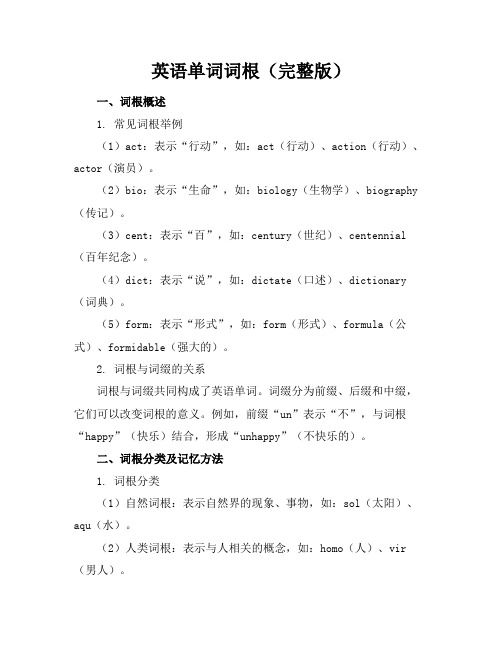
英语单词词根(完整版)一、词根概述1. 常见词根举例(1)act:表示“行动”,如:act(行动)、action(行动)、actor(演员)。
(2)bio:表示“生命”,如:biology(生物学)、biography (传记)。
(3)cent:表示“百”,如:century(世纪)、centennial (百年纪念)。
(4)dict:表示“说”,如:dictate(口述)、dictionary (词典)。
(5)form:表示“形式”,如:form(形式)、formula(公式)、formidable(强大的)。
2. 词根与词缀的关系词根与词缀共同构成了英语单词。
词缀分为前缀、后缀和中缀,它们可以改变词根的意义。
例如,前缀“un”表示“不”,与词根“happy”(快乐)结合,形成“unhappy”(不快乐的)。
二、词根分类及记忆方法1. 词根分类(1)自然词根:表示自然界的现象、事物,如:sol(太阳)、aqu(水)。
(2)人类词根:表示与人相关的概念,如:homo(人)、vir (男人)。
(3)动作词根:表示动作、行为,如:mov(移动)、cre(创造)。
(4)数量词根:表示数量、大小,如:dec(十)、mill(千)。
2. 记忆方法(1)联想记忆:将词根与实际生活中的事物、场景相联系,如:port(港口),联想到“船舶停靠的港口”。
(2)词根家族:将具有相似意义的词根进行归纳,如:spec (看)、vis(看)、vid(看)。
(3)词根变形:注意词根在不同单词中的变形,如:spect(看)在“inspect”(检查)中变形为“spect”。
三、词根在实际单词中的应用1. 通过词根扩展词汇biography(传记):bio(生命)+ graph(写)+ y(名词后缀),意为“关于一个人生命的书写”。
autograph(亲笔签名):auto(自己)+ graph(写),意为“自己的书写”。
photograph(照片):photo(光)+ graph(写),意为“用光写的图像”。
完整版英语词根词缀全表
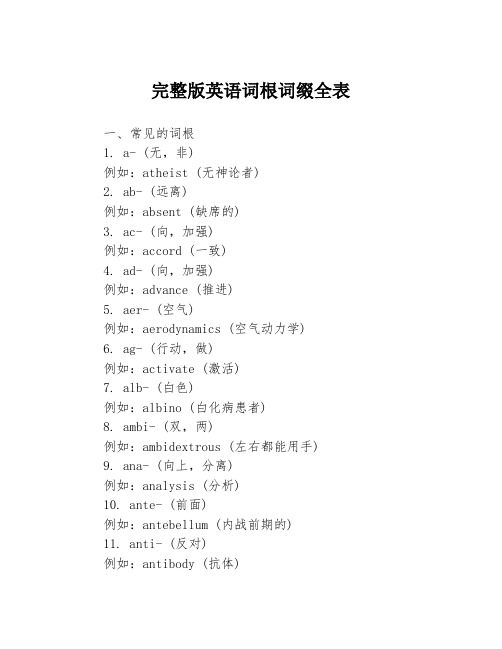
完整版英语词根词缀全表一、常见的词根1. a- (无,非)例如:atheist (无神论者)2. ab- (远离)例如:absent (缺席的)3. ac- (向,加强)例如:accord (一致)4. ad- (向,加强)例如:advance (推进)5. aer- (空气)例如:aerodynamics (空气动力学)6. ag- (行动,做)例如:activate (激活)7. alb- (白色)例如:albino (白化病患者)8. ambi- (双,两)例如:ambidextrous (左右都能用手)9. ana- (向上,分离)例如:analysis (分析)10. ante- (前面)例如:antebellum (内战前期的)11. anti- (反对)例如:antibody (抗体)12. apo- (离开,远离)例如:apology (道歉)13. aqua- (水)例如:aquarium (水族馆) 14. arch- (首席,最重要的) 例如:architect (建筑师) 15. audi- (听)例如:audience (观众)16. auto- (自动)例如:automatic (自动的) 17. belli- (战争)例如:bellicose (好战的) 18. bene- (好的)例如:benefit (好处)19. bi- (双)例如:bilateral (双边的) 20. bio- (生命)例如:biology (生物学) 21. brev- (短)例如:brevity (简短)22. cad- (落下)例如:cascade (瀑布)23. cap- (拿,抓)例如:capture (捕获)24. carn- (肉)例如:carnivore (食肉动物) 25. caus- (原因)例如:cause (原因)26. ced- (走,离开)例如:cede (放弃)27. cent- (百)例如:century (世纪)28. cep- (拿,抓)例如:reception (接待)29. cert- (确定)例如:certain (确定的)30. chron- (时间)例如:chronological (按时间顺序的) 31. circ- (圆,周围)例如:circle (圆)32. cis- (割,切)例如:incision (切口)33. civi- (城市)例如:civilization (文明)34. clam- (喊,叫)例如:proclamation (公告)35. cogn- (认识)例如:cognitive (认知的)36. col- (共同)例如:collaborate (合作)37. com- (一起)例如:combine (合并)38. contra- (反对)例如:contradict (反驳)39. corp- (身体)例如:corpse (尸体)40. cosm- (宇宙)例如:cosmic (宇宙的)41. counter- (反对)例如:counteract (抵消) 42. cred- (相信)例如:credibility (可信度) 43. crypt- (隐藏)例如:cryptic (神秘的) 44. cub- (立方体)例如:cubic (立方的)45. cumb- (躺)例如:recumbent (躺着的) 46. cycl- (圆圈)例如:cyclic (循环的)47. de- (向下)例如:decrease (减少)48. dec- (十)例如:decimal (十进制的) 49. dem- (人民)例如:democracy (民主) 50. dendr- (树状物)例如:dendrite (树突)51. dent- (牙齿)例如:dentist (牙医)52. derm- (皮肤)例如:dermatitis (皮炎)53. di- (两个)例如:diagonal (对角线)54. dia- (穿过)例如:diagonal (对角线)55. dict- (说)例如:predict (预测)56. dis- (分开)例如:disconnect (断开连接) 57. doc- (教)例如:document (文件)58. domin- (主人)例如:dominate (控制)59. don- (赠送)例如:donate (捐赠)60. dors- (背部)例如:dorsal (背部的)61. duc- (引导)例如:induce (诱导)62. dur- (坚固)例如:durable (耐用的)63. dyna- (能量)例如:dynamic (动态的)64. dys- (困难)例如:dysfunction (功能障碍) 65. e- (电子的)例如:electron (电子)66. eco- (环境)例如:ecology (生态学)67. ego- (自我)例如:egotistical (自大的) 68. em- (进入)例如:embed (嵌入)69. en- (使)例如:enable (使能够)70. end- (内部)例如:endocytosis (内吞作用) 71. equ- (相等)例如:equal (相等的)72. erg- (工作)例如:energy (能量)73. esth- (感觉)例如:aesthetic (美学的) 74. eu- (好的)例如:euphoria (欣快感)75. ex- (出,外)例如:exit (出口)76. extra- (超过)例如:extraordinary (非凡的) 77. fac- (使)例如:facilitate (促进)78. fall- (欺骗)例如:fallacy (谬论)79. fals- (错误)例如:false (虚假的)80. feder- (联邦)例如:federation (联邦制度) 81. fid- (信任)例如:confide (信任)82. fil- (线)例如:filament (灯丝)83. fin- (结束)例如:finish (完成)84. flex- (弯曲)例如:flexible (柔韧的) 85. flu- (流)例如:fluid (流体)86. foli- (叶)例如:foliage (叶子)87. forma- (形状)例如:formation (形成)88. fort- (强壮)例如:fortitude (坚忍)89. fract- (破碎)例如:fracture (骨折)90. frig- (冷)例如:refrigerator (冰箱) 91. fum- (烟)例如:fume (冒烟)92. fus- (融化)例如:fusion (熔合)93. gam- (婚姻)例如:gamete (配偶子)94. gastr- (胃)例如:gastric (胃的)95. gen- (种类)例如:generation (一代)96. geo- (地球)例如:geology (地质学)97. germ- (生命)例如:germination (发芽)98. giga- (十亿)例如:gigabyte (千兆字节)99. gloss- (光亮)例如:glossy (有光泽的)100. gluc- (糖)例如:glucose (葡萄糖)二、常见的词缀1. -able, -ible (能够,可被)例如:provable (可证明的), responsible (负责的) 2. -al (有关,属于)例如:federal (联邦的), cultural (文化的)3. -ance, -ence (动作或状态)例如:guidance (指导), persistence (坚持)4. -ant, -ent (有…的,做…的)例如:important (重要的), independent (独立的) 5. -ar, -er (具有…特征的)例如:familiar (熟悉的), harder (较难的)6. -ate (使…,成为…)例如:graduate (毕业), elaborate (详细阐述) 7. -ation (动作或状态)例如:education (教育), application (应用)8. -ed (过去式)例如:started (开始了), walked (走了)9. -en (使成为…)例如:fasten (系好), strengthen (增强)10. -er (比较级)例如:bigger (更大的), better (更好的)11. -est (最高级)例如:biggest (最大的), best (最好的)12. -ful (充满…的)例如:grateful (感激的), powerful (强大的) 13. -ic (有关… 的)例如:romantic (浪漫的), historic (历史性的) 14. -ify, -fy (使…,成为…)例如:intensify (加强), clarify (澄清)15. -ile (某种状态或特征)例如:versatile (多才多艺的), fragile (易碎的) 16. -ism (相信或追求…)例如:racism (种族主义), feminism (女权主义) 17. -ist (从事某种活动或专业的人)例如:dentist (牙医), scientist (科学家)18. -ite (居住在…)例如:Israelite (以色列人), meteorite (陨石) 19. -ity, -ty (表示状态或性质)例如:creativity (创造力), honesty (诚实)20. -ize (使成为…)例如:normalize (规范化), personalize (个性化)21. -less (没有…的)例如:thoughtless (没有思考的), useless (没用的)22. -logy (研究或学科)例如:biology (生物学), psychology (心理学)23. -ly (表示方式或状态)例如:quickly (迅速地), slowly (慢慢地)24. -ment (状态或过程)例如:improvement (改进), development (发展)25. -ness (具有…的状态)例如:happiness (幸福), illness (疾病)26. -ology (学科或研究)例如:biology (生物学), anthropology (人类学)27. -ous (含有…的)例如:famous (有名的), dangerous (危险的)28. -phobia (对…的恐惧)例如:arachnophobia (蜘蛛恐惧症), agoraphobia (广场恐惧症)29. -sis (状态或过程)例如:analysis (分析), diagnosis (诊断)30. -tic (有关…的)例如:neurotic (神经质的), athletic (运动员)31. -tion, -sion (动作或状态)例如:creation (创作), decision (决定)32. -y (状态或性质)例如:sleepy (困倦的), greedy (贪婪的)以上就是英语常见的词根和词缀,掌握它们有助于我们更好地理解和运用英语。
英语常见的词根词缀
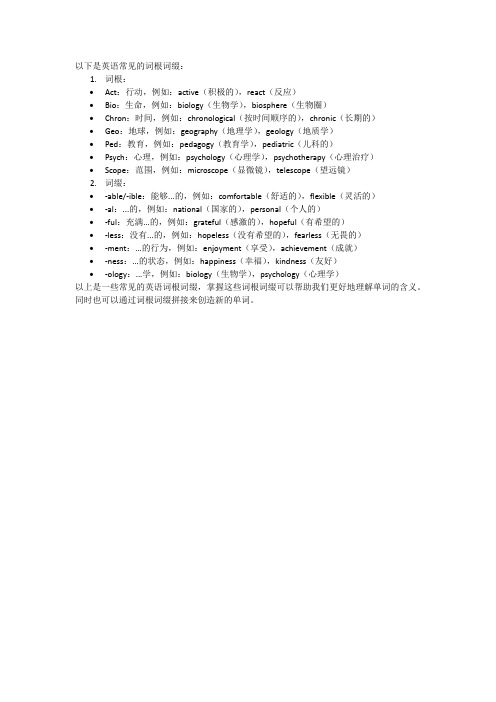
以下是英语常见的词根词缀:
1.词根:
•Act:行动,例如:active(积极的),react(反应)
•Bio:生命,例如:biology(生物学),biosphere(生物圈)
•Chron:时间,例如:chronological(按时间顺序的),chronic(长期的)
•Geo:地球,例如:geography(地理学),geology(地质学)
•Ped:教育,例如:pedagogy(教育学),pediatric(儿科的)
•Psych:心理,例如:psychology(心理学),psychotherapy(心理治疗)
•Scope:范围,例如:microscope(显微镜),telescope(望远镜)
2.词缀:
•-able/-ible:能够...的,例如:comfortable(舒适的),flexible(灵活的)
•-al:...的,例如:national(国家的),personal(个人的)
•-ful:充满...的,例如:grateful(感激的),hopeful(有希望的)
•-less:没有...的,例如:hopeless(没有希望的),fearless(无畏的)
•-ment:...的行为,例如:enjoyment(享受),achievement(成就)
•-ness:...的状态,例如:happiness(幸福),kindness(友好)
•-ology:...学,例如:biology(生物学),psychology(心理学)
以上是一些常见的英语词根词缀,掌握这些词根词缀可以帮助我们更好地理解单词的含义。
同时也可以通过词根词缀拼接来创造新的单词。
- 1、下载文档前请自行甄别文档内容的完整性,平台不提供额外的编辑、内容补充、找答案等附加服务。
- 2、"仅部分预览"的文档,不可在线预览部分如存在完整性等问题,可反馈申请退款(可完整预览的文档不适用该条件!)。
- 3、如文档侵犯您的权益,请联系客服反馈,我们会尽快为您处理(人工客服工作时间:9:00-18:30)。
三、常见词根及构词
pos = put 放置
pose, position, expose, exposure, compose, composition, propose, proposal, oppose, opposition, impose, dispose, disposal, preposition
tract = draw 拉,抽,引
tractor, attract, attraction, attractive, distract, subtract, contract, abstract, drag, draw, straight, straighten, stretch
sec, sequ = follow 跟随
second, secondary, sequence, subsequent, consequence, consequently
vid, vis, vey, vy = see 看
visible, vision, visibility, invisible, visual, video, videophone, revise, revision, supervise, supervision, evident, evidence, visit
spect=look 看
spectator, spectacle, spectacular, prospect, inspect, inspection, expect, expectation, respect, respectable, respectful, respective, respected, suspect, suspicion, specific, despite mob, mov, mot = move动
mobile, mobility, mobilize, automobile, motion, motive,
motivate, motivation, motor, move, promote, promotion, emote, remote
ced, ceed, cess , gress = go, walk 行走
precede, proceed, procedure, process, exceed, excess, excessive, succeed, success, successful, succession, successive, successor, access, accessible, progress, congress, regress, aggressive
rupt=break破
bankrupt, interrupt, corrupt, disrupt, erupt
mini, min = small, little 小
miniskirt, minimize, minimum, minus, minute, minority, diminish
scrib, scrip 写,记,抄
describe, description, script, manuscript, prescribe, prescription
dict, dic = say 言,说
diction, dictionary, contradict, dictate, dictation, dictator, predict, prediction, predictable, indicate, verdict
miss, mit = send 投,送,发
mission, missile, dismiss, dismissal, transmit, transmission, emit, emission, promise, compromise, committee, commission
port = carry 拿,带,运
portable, import, export, transport, report, support
leg, legis 法
legal, legalize, illegal, legislate, legislation, legislature solu, solv 洗,溶解
solution, solve, resolve, resolution, dissolve
press 压
impress, impression, express, suppress, depress
viv, vit=live活:
live, living, lively, survive, livelihood, alive, revive, vivid, vital, vitamin
count=number:
account, accountant, discount, number, numeral, numerous, innumerable
ag=act 行动,做:
action, exactly, react, interact, transact, radioactive, agent, agenda, agency,
fac(t)=make做,作,制造:
facility, factory, faculty, affect, defect, infect, perfect, efficient, fiction, artificial, proficiency, feasible
sign=mark记号,信号:
remark, signal, signature, design, designate, significance,
du, doub, coup=two二:
dual, double, doubtful, couple, dubious, duplicate, dual spher=ball球:
balloon, ballot, hemisphere, atmosphere
popul, publ=people人:
popular, public, publicity, republic, publish, republican, population,
men, min=mind心灵,精神:
mind, remind, mention, mental, comment, memory, memorial, remember, commemorate
struct=build建造:
construct, instruct, obstruct, destruction, destroy
fund, found=base基础:
basement, basis, foundation, profound, fund, refund, fundamental
part=divide分,分开:
dividend, individual, particle, participate, particular, partner, apart, counterpart, depart, impartial, department, party, apartment, compartment
pend,pens-hang悬挂:
dependent, independence, append, appendix, suspend,
duc(t)=lead引导:
conduct, deduct, misconduct, educate, induce, introduce, produce, reduce,
oper=work工作:
operate, cooperate, opera
ven,vent=come来:
venture, adventure, avenue, convention, invent, eventually, prevent, intervene
voc,vok=claim呼喊,叫喊,声音:
proclaim, reclaim, exclaim, advocate, provoke, vocal, voice, sect=cut切,割:
section, segment, intersection, sector
grat, grac, gree=please高兴,感激:
grace, grateful, gratitude, congratulation, agree, agreeable, greet, pleasure, pleasant, disagree
vail, val=worth价值:
worth, worthy, worthwhile, available, prevail, value, valid, validity, valve, evaluate, equivalent
pel, peal, puls=drive驱动:
appeal, compel, compulsion, compulsory, propel, pulse, impulse。
